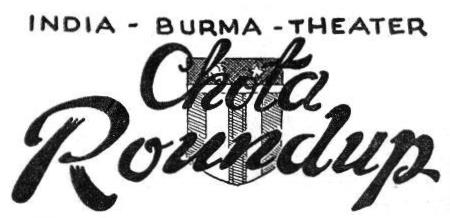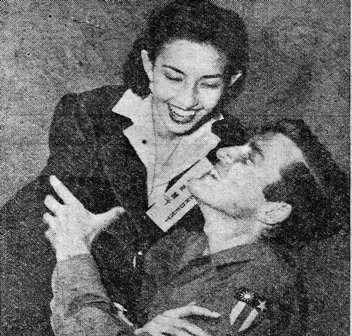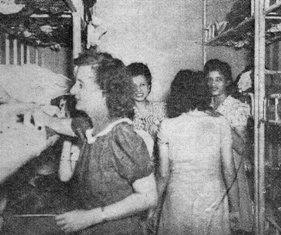
Vol. 1 CALCUTTA MAY 9, 1946 No. 4  Creating an atomic effect herself, Lorraine Miller will soon appear in an atomic bomb drama,
"Rendezvous 24."
Creating an atomic effect herself, Lorraine Miller will soon appear in an atomic bomb drama,
"Rendezvous 24."
|
Many May Fly Home; Jumper To Carry 800
Approximately 180 persons from the I-B Theater will return to the U.S. by air this month, it was disclosed this week by Theater G-1. With an average of 40 weekly, personnel to fly home will be processed at Camp Dhakuria after being given a 24-hour notice.
Following is the priority system for air travel:
(1) Emergency returnees.
(2) Medical and Dental officers and nurses.
(3) Dependency discharges.
(4) Officer and enlisted personnel according to length of overseas service.
An estimated 800 persons will be on the Marine Jumper, the final troopship scheduled to arrive in Calcutta May 25 and depart May 31. On its return to the U.S. the Jumper is tentatively scheduled to refuel in Singapore and dock in Manila to fill up her remaining spaces.
The trip is estimated to take about 30 days from Calcutta to San Francisco, a Theater Transportation spokesman stated. There are 191 first class spaces available on the Jumper out of a 3,149 total.
With the departure of the Marine Adder and Marine Panther recently, the I-B Theater strength is down to about 1,500, a Theater spokesman said. Two hundred and seventy ATC personnel will leave by boat in June while approximately 150 men will remain behind in the Detachment, U.S. Army in India, the spokesman added.
Collier Describes Some
Of Calcutta's Dark Spots
By SGT. RICHARD COLLIER Chota Roundup Special Writer
The opium den we visited a few weeks back was a good enough thrill for anyone's evening out. But it was little more than a Chinese sucker on the Indian tree. Calcutta's Babu doesn't go for hop.
Way back 40 years most of the dens off Machua Bazaar or the Chitpore Road were housing fat goldsmiths or Bengali merchants, seeking pipe dreams the hard way. They were shy about smoking and cowered into dark corners when the police discovered them. Lately it has died out, since our humble Babu, it seems, has a less elastic constitution than Charley Wong, and sickness rather than sweet headiness was more often the result. But there are other ways of wooing sweet dreams and forgetting the cares of life.
At the corner of Watgunge Street, giving out on to Circular Garden Reach Road, is a long cavernous hole in the wall covered with heavy iron bars. It is a ganja den and ganja, for those who don't know, is a dangerous narcotic smoked in tobacco. It is "Out of Bounds to all Ranks."
DESSICATED OLD MAN
Behind the bars most nights sits an old dessicated, grey-looking man hunched up on the floor. Beside him is a big black steel box that gives him a hollow consumptive appearance and his face bobs there in the circle of light like a dead man's on a noose. The men come here furtively in the shadowed hours and buy a few annas worth for the night.
Ganja is an opiate, a by-product of the poppy; it looks like grey, dried up moss and smokes like a motorman's glove. The coolies smoke it in their cigarettes and the fumes go to their heads, much better than Old King Toddy, some of them say, and for a few hours you feel like one hell of a guy. It is maybe an understatement to call it harmful. It is just another reason why coolies cough and go on coughing and then suddenly just stop.
In the good old times of war, every GI who has spent a week in Calcutta knew the Hinusthan Building, Camp Maidan, the New Market and the Lighthouse Bar. Dimly, maybe, he also had intelligence of the balonied fleshpots of Karaya Road, long a legend only, where a staggering variety of European femmes fatales made the hymeneal
|
Fewer, however, knew Sonagachee.
SHADED STREET
Sonagachee is the street of balconies and dim shaded lights, of jasmine smells and soft muffled laughter. Sonagachee is to Calcutta what the Casbah is to Algiers, what Iwelei was to Honolulu. Some say it is the largest red-light district east of Suez but even in the war years it has successfully preserved its ancient tradition of inviolability; lying far beyond the "Off Limits" signs, it has been known to few troops.
It is as Indian as a pennyworth of pan. It is those few square miles of rooftops that house the lights and loves of the Ghariwallah and the unknown coolie, the brothel quarter of the young Babu. In certain quarters its elegance tops anything that even Karaya knew, a world of silken cushions sybaritie hangings, scaling down on the other extreme to a few annas worth of dubious joy, with a sacking screen for privacy.
The most typical view is from Gorasanko Lane. A rabbitwarren maze of high stone houses twisting away into nothingness; tired little coffee-skinned girls in dingy purple saris, twittering among themselves like sparrows at dusk, or else sunk in apathy upon the dank odorous stones of hundreds of little box-like courtyards.
CHOR BAZAAR
Do you want to buy anything in Calcutta, a footbath or a concert grand, a topcoat or an ice bucket? Then you must visit chor bazaar (the thieves market) as they call it in these parts. The entrances to it are low and carefully hidden from the casual stroller.
I went with the Calcutta Police. A keen sharp wind drove down the passage, bringing down the dead Scaldah night and we entered the bazaar with a clatter of feet that brought the eyes glinting from the ill-lit stalls, weasel eyes, prying from the burrows.
Nobody here flaunts his signboard, nobody has a specialty line - not even bright lights. The market is only open three hours a day, from six to nine at night. By his light you are less likely to recognize any of your own chattels. Everyone here is what they call a "fence" - a receiver of stolen goods - but they are not all goods stolen in this city.
In Delhi there is a similar bazaar. Here they sell the pick of Calcutta's loot. We get an option on Delhi's in return.
NOT SO BLATANT NOW
Nothing here now is quite as blatant as it used to be. In the old days, when the young sahib lost his shirt and the bearer didn't "malum," he just shrugged his shoulders, went chor bazaar and bought it back. But in these days they deal in more dangerous cargo.
There are a record number of brogans that would look much more at home in the bootstores of the U.S. Army, plus a good many shining revolver holsters and GI hats. The market has taken on a pretty martial flavor.
But they don't like visitors from Police Headquarters in the chor bazaar. That much was quite evident.
|
|
BURRA CLUB DOINGS
The Red Cross Burra Club has announced the permanent closing of its doors next Wednesday, May 15. In celebration of three succesful years of good fun and entertainment, the club intends to culminate activities in a gala Burra manner.
On the closing date eve, May 14, 8:30 p.m., there will be informal dancing accompanied by a bouffet supper. Everybody is welcome, so come along a nd make the closing an eventful one, invited Marguerite Burke, program director.
The club will remain open til 11:00 p.m. on May 15, and then close for good.
The Chota Roundup is a weekly newspaper of the United States Forces, published by and for the men in the India-Burma Theater for news and pictures supplied by staff members, soldier correspondents, and United Press. Chota Roundup is printed every Thursday by The Statesman in Calcutta, India. Editorial matter should be sent directly to the Editor, Sgt. E. Gartly Jaco, Hq., USF, IBT, APO 885, New York, N.Y. and should arrive not later than Saturday in order to be included in the following week's issue. Pictures must arrive by Friday and must be negatives or enlargements.

|
MAY 9, 1946
Original issue of Chota Roundup shared by CBI Veteran Douglas MacLeod
Copyright © 2009 Carl Warren Weidenburner
TOP OF PAGE PRINT THIS PAGE ABOUT THIS PAGE SEND COMMENTS
PREVIOUS ISSUE CLOSE THIS WINDOW NEXT ISSUE
 Sgt. Donald Holdaway, Tonawanda, N.Y., hoists his Indian bride, Dorothea, from the gangplank of the Marine
Cardinal. Along with Dorothea were 23 brides from India, the first to arrive in the U.S. The couple met in
Calcutta where Dorothea worked for the USAAF.
Sgt. Donald Holdaway, Tonawanda, N.Y., hoists his Indian bride, Dorothea, from the gangplank of the Marine
Cardinal. Along with Dorothea were 23 brides from India, the first to arrive in the U.S. The couple met in
Calcutta where Dorothea worked for the USAAF.
 Waiting patiently are some of the 60-odd wives of GI's who are going to the U.S. on the Panther.
Waiting patiently are some of the 60-odd wives of GI's who are going to the U.S. on the Panther.
 Photo shows wives coming up the gangplank with Indian coolie accompaniment while interested bystanders watch
the proceedings.
Photo shows wives coming up the gangplank with Indian coolie accompaniment while interested bystanders watch
the proceedings.
 Four of the American-to-be making themselves comfortable in their cabins. The brides were all smiles and happy
to get started toward their future homeland. The Marine Panther will dock in Manila to fill up her
remaining spaces. Some 700 men, 45 ARC personnel, six nurses, and others including civilians boarded the Panther
before she departed Monday.
Four of the American-to-be making themselves comfortable in their cabins. The brides were all smiles and happy
to get started toward their future homeland. The Marine Panther will dock in Manila to fill up her
remaining spaces. Some 700 men, 45 ARC personnel, six nurses, and others including civilians boarded the Panther
before she departed Monday.
 Waiting patiently are some of the 60-odd wives of GI's who are going to the U.S. on the Panther.
Waiting patiently are some of the 60-odd wives of GI's who are going to the U.S. on the Panther.
 Waiting patiently are some of the 60-odd wives of GI's who are going to the U.S. on the Panther.
Waiting patiently are some of the 60-odd wives of GI's who are going to the U.S. on the Panther.
 Top photo is the entrance to Replacement Depot No. 3 near the 142nd General Hospital area in Calcutta.
Middle photo is Sgt. Millard Hinton, a casual to be processed in the "repple depple" as he enters the depot.
At bottom, Hinton and other I-B GI's start their first processing line.
Top photo is the entrance to Replacement Depot No. 3 near the 142nd General Hospital area in Calcutta.
Middle photo is Sgt. Millard Hinton, a casual to be processed in the "repple depple" as he enters the depot.
At bottom, Hinton and other I-B GI's start their first processing line.